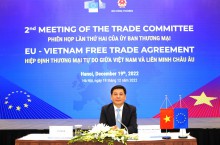The News
Updated policies and business rights in Romania
As a member of the European Union (EU) in 2007, Romania will implement and benefit from trade agreements between the EU and its partners, namely: The EU's Generalized System of Preferences (GSP) aims to eliminate import duties on goods imported into the EU from developing countries; Euro-Mediterranean Partnership Agreement; Partnership agreements between the EU and African, Caribbean and Pacific countries; and Free trade agreements between the EU and Singapore, Canada, Japan, and Vietnam.
As a member of the European Union (EU) in 2007, Romania will implement and benefit from trade agreements between the EU and its partners, namely: The EU's Generalized System of Preferences (GSP) aims to eliminate import duties on goods imported into the EU from developing countries; Euro-Mediterranean Partnership Agreement; Partnership agreements between the EU and African, Caribbean and Pacific countries; and Free trade agreements between the EU and Singapore, Canada, Japan, and Vietnam.
1. Tax policy and tax rates
In Romania, personal income tax is 10%, which is relatively low compared to the average of 38% in the EU. Corporate income tax of 16%, Europe's lowest, is lower than the EU's average of 21%. Dividends are subject to 5% income tax.
The Romanian government is committed to reducing the tax burden, from 2017 VAT was lowered to 19%, 18% in 2018. VAT on food goods is 9% and entertainment services are 5%. Sale of houses, advertising services and agricultural inputs is exempt from VAT. For IT and research industries, income tax exemptions for reinvestments and income tax for employees.

2. Free Trade Agreements
As a member of the European Union (EU) in 2007, Romania will implement and benefit from trade agreements between the EU and its partners, namely:
- The EU's Generalized System of Preferences (GSP) aims to eliminate import duties on goods imported into the EU from developing countries;
- Euro-Mediterranean Partnership Agreement;
- Partnership agreements between the EU and African, Caribbean and Pacific countries;
- Free trade agreements between the EU and Singapore, Canada, Japan, and Vietnam.
3.Establishment of businesses in Romania
Foreign companies need to consider choosing the appropriate type of company in Romania such as General Partnership (SNC), Limited Partnership (SCS), Joint Stock Company (SA), Representative Offices, Branches ... It is necessary to carefully refer to the regulations on the types of companies prescribed by the Romanian government.
Joint venture company (SNC): the type of company established with at least two shareholders. The partnership is based on a contract. Like the other four types of companies, shareholders must register their partnership with the Department of Justice's National Commercial Registration Office. Shareholders in the joint venture company have joint and unlimited liability for the debts and obligations of the company.
Limited Venture Company (SCS): A limited venture company consists of one or more general shareholders managing the business, as well as having one or more other shareholders with limited contributed capital (money or other assets) but not involved in the management of the company. Limited shareholders are not responsible for the debts and obligations of the company other than their share of the registered capital, while other shareholders (managing the company) have general responsibility and liability for the debts and obligations of the company.
Joint Stock Company (SA): A joint-stock company is a limited liability company with at least two shareholders and a registered share capital of at least 119,000 RON (about 27.87 USD). Shares with a nominal value of at least RON 0.1 ($0.02) per share.
Limited Liability Company (SCA): This type of company has the same legal regime as a limited company, which differs in that the capital is divided into shares. Therefore, the obligations of the company are secured by share capital and by general partners, without limitation and with mutual responsibility. Limited partners are liable only within the registered share capital limits. Like holding companies, SCA's share capital cannot be lower than RON 119,000 (US$27.87).
Limited Partnership (SRL): is a company formed by at least one shareholder and cannot have more than 50 shareholders. An individual or legal entity can act as the sole shareholder of only one SRL. In addition, a single shareholder of the SRL group cannot be another company in which it is owned by a single shareholder. The transfer of shares to a third party must be approved by 3/4 of the shareholders holding the company's capital.
Representative offices: Foreign companies can open representative offices in Romania after registering with the Foreign Trade Department under the Ministry of Economy. Representative offices cannot carry out commercial activities on their own, but they have the right to promote the business of their parent organizations in Romania.
Affiliates: can only carry out activities within the scope of the obligations of the parent company. Must be registered with the relevant commercial registration office.
4. Some useful addresses
Romanian Embassy in Vietnam
5 Le Hong Phong Str, Ba Dinh Dist. HanoiT:84-4-38452014
F: 84-4-38430922romambhan@fpt.vn
Embassy of Vietnam in Romania
#35, C.A. Rosetti St., Sec.2, Bucarest RumaniaT:+40 21 3110334/44
F:+40 21 3121626vietrom2005@yahoo.com
romambhan@fpt.vn



